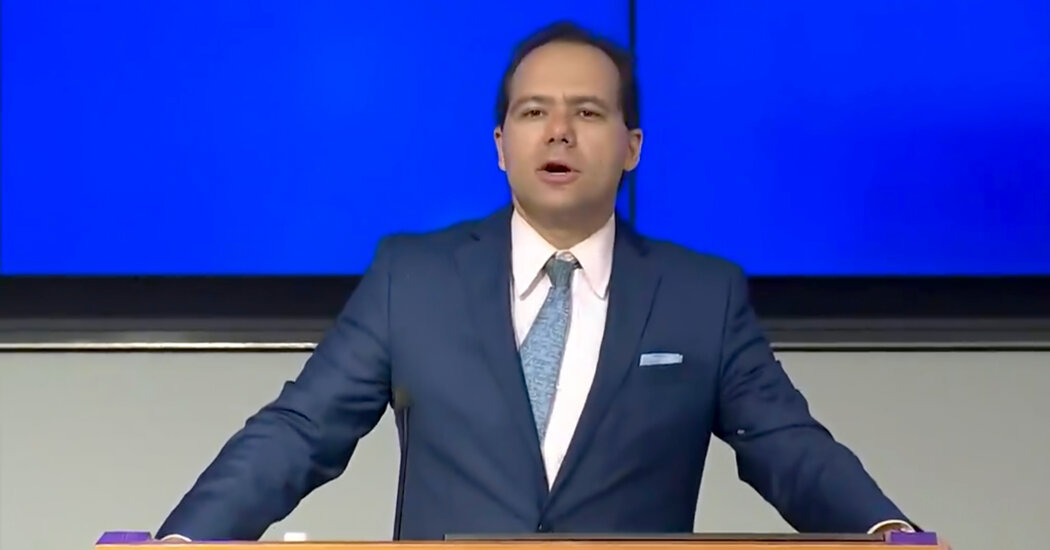Ilya Shapiro has apologized after tweeting that President Biden was poised to nominate not “the objectively best pick,” but a “lesser Black woman” to the Supreme Court.
Georgetown University’s law school placed a newly hired administrator on leave on Monday after he said on Twitter that President Biden would nominate not “the objectively best pick” but a “lesser Black woman” to be the next Supreme Court justice.
The decision came one day before the scholar, Ilya Shapiro, a prominent libertarian, had been scheduled to assume his role as a senior lecturer and the executive director of the Georgetown Center for the Constitution, which is part of the law school.
Mr. Shapiro, a constitutional law expert at the Cato Institute, a libertarian think tank, drew a sharp rebuke from students, faculty members and alumni with his comments about the search process for the next justice. The posts have since been deleted.
In a tweet posted on Jan. 26, Mr. Shapiro suggested that Mr. Biden should nominate Sri Srinivasan, the Indian-born chief judge on the Court of Appeals for the District of Columbia, to succeed Justice Stephen G. Breyer on the Supreme Court.
“Objectively best pick for Biden is Sri Srinivasan, who is solid prog & v smart,” Mr. Shapiro wrote. “Even has identity politics benefit of being first Asian (Indian) American. But alas doesn’t fit into latest intersectionality hierarchy so we’ll get lesser black woman. Thank heaven for small favors?”
Some had called for the law school, which is among the most prestigious in the nation and sits within a mile of the Supreme Court, to rescind its decision to hire Mr. Shapiro.
Mr. Shapiro had been weighing in on Mr. Biden’s pledge to nominate the first Black woman to the Supreme Court to replace Justice Breyer, who last week announced his plans to retire.
In an email to the law school, whose formal name is the Georgetown University Law Center, its dean said on Monday that the university would investigate whether Mr. Shapiro had violated any of the school’s policies on professional conduct, nondiscrimination and anti-harassment.
“Over the past several days, I have heard the pain and outrage of so many at Georgetown Law, and particularly from our Black female students, staff, alumni and faculty,” the dean, William M. Treanor, said. “Ilya Shapiro’s tweets are antithetical to the work that we do here every day to build inclusion, belonging and respect for diversity.”
In an email to The New York Times on Monday, Mr. Shapiro expressed regret over his tweets, but he maintained that they were not grounds for disciplinary action by the law school.
“I’m optimistic that Georgetown’s investigation will be fair, impartial and professional,” Mr. Shapiro said. “And I’m confident that it will reach the only reasonable conclusion: My tweet was inartful and undermined my antidiscrimination message, which is why I apologized. It was not, however, a violation of any university rule or policy, and indeed is protected by Georgetown policies on free expression.”
In a subsequent tweet that Mr. Shapiro also deleted, he said that if Mr. Biden limited his search to Black female jurists, his nominee “will always have an asterisk attached.”
“Fitting that the Court takes up affirmative action next term,” he added.
The Black Law Students Association at Georgetown condemned Mr. Shapiro’s comments, which it said were racist. The group called for the university to rescind his employment offer in a petition that was signed by more than 900 people.
“At Georgetown Law, Black students are haunted by the shadow of impostor syndrome,” the association said in a letter on Friday to the law school. “Shapiro reinforced this phenomenon by reducing Black women’s accomplishments to ‘small favors’ from ‘heaven.’”
Some other scholars, conservatives and free speech activists rallied around Mr. Shapiro, including the Foundation for Individual Rights in Education, an advocacy group that focuses on First Amendment issues in higher education.
The group on Monday posted on its website a letter supporting Mr. Shapiro that it said had been signed by nearly 60 college professors across the nation.
“Academic freedom protects Shapiro’s views, regardless of whether we agree with them or not,” the group’s letter said. “And debate about the president’s nomination, and about whether race and sex play a proper role in such nominations more generally, would be impoverished — at Georgetown and elsewhere — if this view could not be safely expressed in universities.”
The Cato Institute referred questions to Mr. Shapiro.
Mr. Shapiro, whose hiring was acclaimed by the law school in a news release on Jan. 21, said in his email on Monday that he was eager to start his new role.
“Accordingly, I expect to be vindicated and look forward to joining my new colleagues in short order,” he said.
In announcing the decision to place Mr. Shapiro on leave, Professor Treanor said that Mr. Shapiro would not be on campus while the law school conducted its investigation.
“Racial stereotypes about individual capabilities and qualifications remain a pernicious force in our society and our profession,” Professor Treanor said. “I am keenly aware that our law school is not exempt.”


























